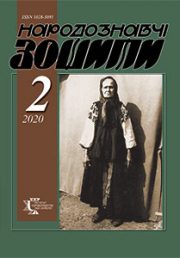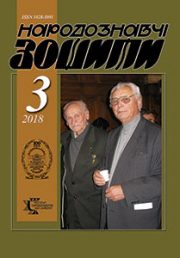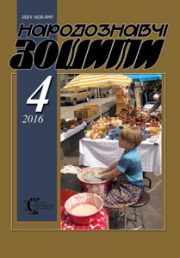The Ethnology Notebooks. 2020. № 1 (151), 200—206
UDK39874.478.085.7 (477) (438)
DOI https://doi.org/10.15407/nz2020.01.200
FESTIVAL «LEMKO’S VATRA» AS AN IMPORTANT PART OF THE ARTISTIC UKRAINIAN-POLISH COOPERATION
FABRYKA-PROTSKA Olga
ORCID ID: https://orcid.org/0000-0001-5188-1491
Candidate of the Art critic, docent
the Department of Musical Ukrainian
Studies and Folk Instrumental Music Art
Institute of Art of the Vasil Stefanyk
Precarpathian National University
Academician Sakharov Street,
34-a, Ivano-Frankivsk,
Ivano-Frankivsk region, 76000, Ukraine
Contacts: e-mail: olgafp4@ukr.net
Abstract. Introduction. The purpose of the Lemko culture festival is to protect, preserve and develop cultural identity of the Lemkos ethnic group. Participants include amateurs, folklore and ethno-rock bands and singers from Poland, Ukraine, Serbia, Croatia, Slovakia, Canada and other countries. The cultural and artistic intentions of the organizers and performers of the action are intertwined and interconnected, composing the integrity of the past, present and future, reflecting the preservation of spiritual culture of the Lemko sub-entity as a whole.
Problem Statement. The article focuses on revealing the history of the origin and functioning of the folk festival Lemkos Vatra (Zdynia, Poland). It is noted that the connection of folklore with oral folklore contributed to the preservation of ethnic identity and ethno-cultural unity with the Ukrainian people, was a factor of self-identification, and also helped the Lemko families for many years to draw on the forces to resist polonization, slovacization. The porpose. The role of the Lemko Festival as a component of artistic Ukrainian-Polish cooperation for decades has been highlighted. The specifics of the festival action are described. Methods of local and regional study of Lemko musical folklore have been applied in the paper.
Results. Despite the dispersion around the world, Lemkos have preserved their culture to date. Due to the nature of the action, the presentation, revival, reproduction and popularization of the deep sacral-mental phenomena of the ethnos, the Lemko folklore festival unites the foundations of the traditional and the spectacular.
It is proved that today the Lemkos Vatra is the most large-scale and most popular event in Poland. The international ethnographic festival of Lemko culture is a kind of worldview that aims to preserve and develop traditions, rituals, song, instrumental and dance culture for future generations. This large-scale artistic phenomenon promotes dialogue between regions and countries, demonstrating national and ethno-cultural achievements, and is a manifestation of new relationships with the viewer and listener, who are often involved in the action.
Conclusion. According to the researchers, intercultural communication solves many problems of spiritual, moral, aesthetic, valued, humanistic character. Mutual exchange of cultural information promotes mutual understanding between peoples.
Keywords: history, Poland, Ukraine, festival, Lemkos, song culture, folklore.
Received 13.01.2020
REFERENCES
Bermes, I. (2018). Festival «Lemkivska Vatra» in Zhdina in the history and culture of subethnos. Bulletin of the National Academy of Management Personnel of Culture and Arts, 1, 101—105; Art Studies. Kyiv [in Ukraіnian].
Vatra, 4 (99). (2017). Heads. editor Victoria Goisak. FHU «LEBO» Gorlice; Printing house «Square» New Soncz [in Poland].
Gorbal, M. (2019). Lemko calendar 2020. Lviv: Institute of Ethnology of NAS of Ukraine [in Ukrainian].
Graban, V. (2019). Lemkos fire allowed Lemkos to be in themselves. Ukrainian almanac 2019 (P. 426). Unification of Ukrainians in Poland. Warsawa [in Poland].CE
Zhirov, M.S., & Popova, L.M. (2012). Culture-forming foundations of songwriting. Scientific reports of Belgorod State University. Series «Philosophy. Sociology. Right», 20 (115) (Vol. 18, pp. 287—294). Belgorod [in Russian].
Zemtsovsky, I. (1989). From folk song to folk choir: game of words or problem? Traditional folklore and modern folk choirs and ensembles (Issue 2, pp. 6—20). Leningrad, LGITMik [in Russian].
Lishko, V. (2002). Ukrainian-Polish Relations in the Field of Culture 1991—1999. Author’s abstract. Cand. hist. sciences: 07.00.01. Kyiv [in Ukrainian].
Pachos, Y. (2014). Ukrainian-Polish Cooperation in the Field of Culture (first decade of the 21st century): abstract. diss. cand. hist. sciences. Cherkasy [in Ukrainian].
Popova, L. (2011). Song creativity as an aspect of philosophical and cultural knowledge. Culture: experience, problems, research and teaching of the humanities (Pp. 272—276). Belgorod: BGIKI [in Russian].
Romanyuk, I., & Pachos, Y. Festivals of Ukrainian Culture in Poland as an Element of Fatherly Ukrainian-Polish Cooperation at the Beginning of the 21st century. Retrieved from: http: //dspace.nbuv.gov.ua/handle/123456789/87883 [in Ukrainian].
Strelchuk, L., & Strelchuk, V.V. (2013). Institutional components of Ukrainian-Polish humanitarian relations and cooperation. Lutsk: Volyn Antiquities [in Ukrainian].
Totsenko, Zh.M. (2012). Cooperation in the field of culture as a component of Ukrainian-Polish humanitarian relations: Author. diss. cand. sciences: 26.00.01. Kyiv [in Ukrainian].
Fabryka-Protska, O.R. (2013). Song culture of Lemkos of Ukraine (XX—XXI centuries). Ivano-Frankivsk: Nova Zorya [in Ukrainian].
Fabryka-Protska, O. (2019). Specificity of presentations of folk music at folk festivals of the Ukrainian western border. The Ethnology Notebooks, 1 (145), 208—213 [in Ukrainian].
Furdychko, A. (2008). The Ukrainian Melos at the Turn of the Millennium: the dynamics of the folklore tradition. Kyiv: Kind. CNUCiM Center [in Ukrainian].
Furdychko, A. (2015). Song folk culture as a means of preserving national identity. Culture and art in the modern world: Scientific notes of the Kyiv National University of Culture and Arts (Vol. 16, pp. 68—74). Kyiv [in Ukrainian].
Chaplyk, K. (2010). The Transformation of the Song Folklore of Lemko Migrants in Western Ukraine (Post-War Period): Author’s abstract diss. cand. arts. Kyiv: M.T. Rylsky IMF of NAS of Ukraine [in Ukrainian].






